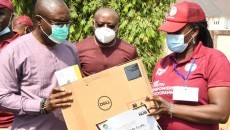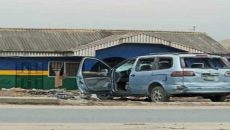Kenneth Okpara is the Delta State Commissioner for Finance and Economic Planning. In this interview with Adekunbi Ero, executive editor, Tony Manuaka, senior associate editor, Stella Sawyerr, associate editor, Tony Akaeze, senior assistant editor, and Adewale Adelola, photojournalist, says in Nigeria and Delta State, a lot has been achieved in terms of results on ground in 15 years of democracy
In 15 years, what has democracy brought to the economy of Delta State?
Democracy has brought about openness and accountability because things are now done with the three tiers of government participating fully unlike what we had under the military regimes where only one person took all the decisions. There is also the element of debate of things that are being done. The press is also freer. Those things to me, coming from a development background, help in economic development because we believe that one of the things that kill development is corruption and lack of transparency. But when you allow the people to participate in how their budgets are arrived at and how the implementation is carried out, they give you feedback and at the end of the day, help you in achieving results. So by and large, I believe that in Nigeria and in Delta State, a lot has been achieved in terms of results on ground. Peoples’ lives are now better off. Though that is also questionable, Nigeria’s gross domestic products as well as that of Delta State have improved over the years. But the key question everybody is asking is, “have the lives of the people witnessed improvement?” I believe so, but I also think that it can’t compare with the way we have fared in terms of our wealth. So there is still a gap.
Apart from federal allocation, by what other means is the state generating funds to meet competing needs of the people?
Delta State gets a large chunk of its income from the Federation Account. Other sources of revenue give us about 15 per cent. In the last three years, the actual contribution of other sources of revenue to the budget is about 15 per cent. Federal allocation contributes about 75 per cent to 85 per cent of our budget. Part of it is derivation. If we get say N10 billion in a month, close to N4 billion to N5 billion comes from derivation. That is why the governor came up with this idea of Delta Beyond Oil because we have seen that projects are not consistently paid for as we would like to due to the dwindling revenue that comes from the federal government. If there is a fall in oil price, like last year, from May till December we were paid only 75 per cent of the allocation that was supposed to come to our state. The other parts did not come because they said the revenue that was realised was far short of what they were expecting. And if we continue to build our expectations on what we are getting from federal allocations, then we will not achieve our objectives. That is why we now said let’s emphasise on what we can get as internally generated revenue, IGR, through the Delta Beyond Oil initiative. If we are able to encourage more people to use the Warri Port for instance by dualising the Ughelli-Asaba highway, that will encourage people from the South-east to bring their goods to Warri Port rather than Lagos or any other port. If they use that port, there will be increased level of activities and more staff will be engaged. That source of revenue will have a spiral effect on the economy of Warri and that of the state. It will also lead to supply chain; the value chain of things that have to do with transportation will expand our GDP. When you have a problem, it makes you to think of options. We are building industrial park in Warri as part of Delta Beyond Oil. That will attract a lot of companies. If they come there, they will employ people; there would also be a supply chain. Our local entrepreneurs in Warri and its environs will have more businesses. Those that are into agro-business, 60 per cent of Deltans are engaged in agriculture, will key into the agro-based industry by going to plant more of those crops that could be processed or used as raw materials to those companies. So these are some of the things that government is doing but you may not see the effects now till about the next five to ten years.
What is the current level of you IGR?
We make between N3.5 billion and N4.5 billion in a month. It alternates.
You also borrow to finance some of your projects. Don’t you?
Every government has to borrow because if you say you want to rely on only what is coming in, then you are not thinking of future; you are not thinking of growth. What we do is that we try to go for low interest loans. We had a bond of N50 billion earlier. From now, we have also undertaken some loans from the banks because we believe that for the governor to finish strong, the resources we have now will not be adequate. Should we wait until we get those resources, or do them now at a low cost and get the benefits now because it is a two-way thing? You may decide to wait and do it in five years’ time, but in five years’ time the cost will be higher. So you will also deny the people who are supposed to have benefited. But mind you, when you are doing those projects, you are not looking at the direct benefits of those projects. I talked about the roads we are doing. They will bring about more revenue to us. So, most of the projects we are doing are revenue generating. The more staff you have in Delta State, the more Pay As You Earn tax you get. Also, other entrepreneurs who will form part of the supply chain will pay tax. That is why we are working with the Bank of Industry to strengthen the micro, small and medium enterprises. In the recent GDP rebasing that was done, there was more focus on the informal sector but we ignore them; we ignore their contribution to the economy of the country and to the state. The woman who is selling akara, the one that has a barbing salon somewhere, they all have their own contribution to make. We support them with anything that will enhance their productivity. They may employ one or two people. Those things that are being ignored in Nigeria, they may be small; but I think governments are now beginning to look in that direction in order to improve the livelihood of the people.
What is the Delta State government doing about the moribund companies in the state?
As for the moribund companies, what we can do is to create the enabling environment because for me, I don’t think government really has any role to play. If you analyse those industries they used to have, they were ran aground because of the attitude of government to business. What we are trying to do is to encourage the private sector by working with them. Recently, we met with the organised private sector, the Chamber of Commerce and Industry in the state and we said to them, we want to sponsor some of their members who are committed to go on course in Germany. They will learn and showcase some of their products. It will also create quick access to market for them so that at the end of the day, they could reach agreements with foreign investors who may want their products and eventually export to them. They will also learn how those people have done it. Most foreign economies are run by small businesses, not necessarily the big ones. So what we are doing about those moribund companies is that we are talking to some big companies like Nigeria Breweries, Guinness to either buy them over or partner with the owners. But some owners, because of cultural inclinations, they don’t want to let go their companies. So we are encouraging those investors to come and partner with them. The Economic Advisory Team and the Economic Management Team are the ones handling this; going out to meet potential investors. Also government is going along the line of privatisation so that at the end of the day, that will help to bring back Delta State to what it was. But we also have this strategy that I explained earlier, going the way of industrial parks. We will provide the infrastructure and then give it to a concessionaire. They are working on that already. With that, unemployment problem will be resolved. The private sector is taking its rightful place in Delta State but there are areas where government can do well. We have gone into areas like transportation because we needed to show commitment to enable the private sector to come in. Provision of infrastructure, roads, water – these are things government can do for investors to come in. We are partnering with Shoprite; they are coming into Warri and Asaba. We have provided them with the land, we have some equity but the larger equity is held by the private sector.
How sustainable is the Delta Beyond Oil initiative?
If you want to sustain a programme, you institutionalise it. And that is what he is doing. Delta Beyond Oil is reflected in the Board of Internal Revenue; it is reflected in the MDAs, like if we are focusing on agric, which is now an area of interest, if it is entrenched in those institutions that are driving it like Economic Planning that gives the policy direction through the budget and guideline, and then if the MDAs that are driving it allows the civil servants, not just the public servants or the politicians, at the end of the day, it becomes part of them and it becomes a policy statement that can move from year to year rather than an interventionist or political instrument. Some of the problems we have been having in countries like Nigeria are because we don’t have policies to drive what we are doing. It requires cultural change, mind set, so that they see the usefulness of Delta Beyond Oil rather than think that it is Governor Uduaghan’s idea; when he goes, that is all. But when you see that jobs are being created through Delta Beyond Oil, industries are being set up through Delta Beyond Oil, revenues are increasing through Delta Beyond Oil, I think people are going to buy into it.
So what policies have you put in place to ensure that things work this way?
We have put in place, a tracking system in both ministries of finance and economic planning, and that tracking system helps to track physical price. Along the line, there is what we call internal check as a control – a file comes to somebody lower than you before it gets to you. You also play a part in the review process. This plays a role in ensuring that you set standards from the bottom. Right now, all memos are reviewed by the ministry of economic planning before they go to the SSG and then, His Excellency. He looks out for that input that will come from the economic intelligence unit. They are the ones that have the data; they are the ones that would do some kind of intelligence investigation and see whether there are excessive claims in expenditures that are being brought forward. There are a lot of things. We have blocked leakages, excessive spending, revenue leakages that used to be there before, now there are parameters put in place.
Follow Us on Social Media




 WhatsApp us
WhatsApp us